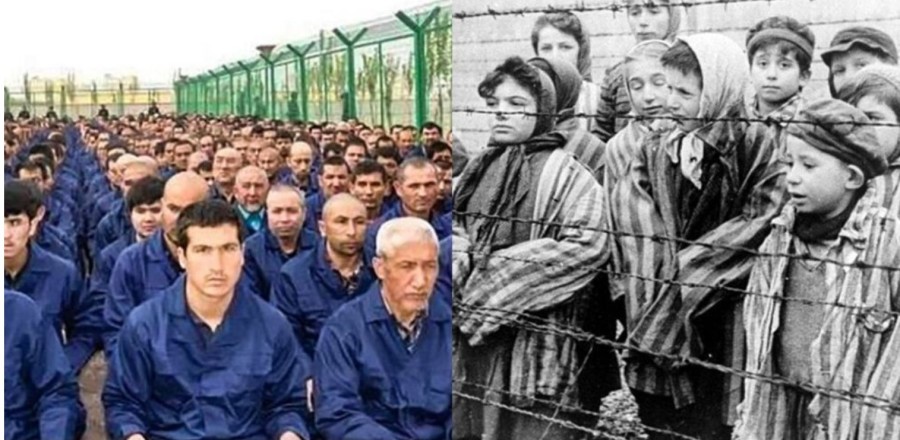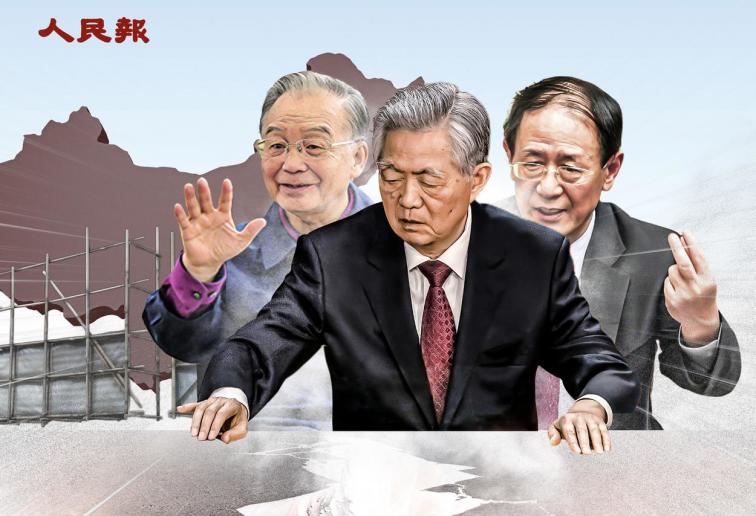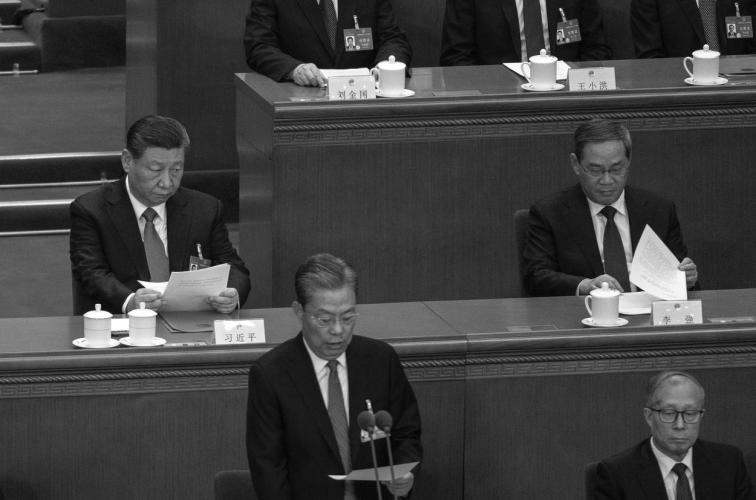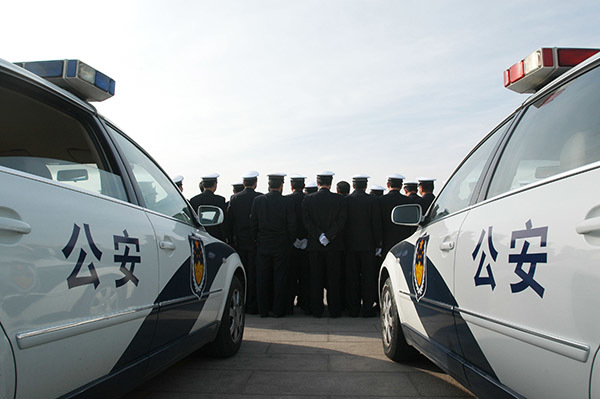Former guards and imprisoned women from Xinjiang re-education camps have confirmed the existence of systematic rape and sexual abuse within the facilities. The image shows a composite of a Xinjiang re-education camp and a World War II Jewish concentration camp. Photo: Screenshot from the official website of the East Turkestan Government-in-Exile (file photo).
[People News] On one hand, the Chinese Communist Party (CCP) is continuously expanding the construction of organ transplant centres; on the other hand, in China, children are "going missing every day and it has already become urbanised" (as netizens say). This inevitably raises suspicions: whose organs are being harvested for these transplants, and who exactly is receiving them? Recently, news that six new organ transplant centres are planned for Xinjiang has sparked widespread concern over the "nationalisation" of citizens' organs in China.
According to a July 3 report by the UK’s Daily Telegraph, citing information from an international human rights organisation, the Chinese Communist Party (CCP) plans to build six new medical centres with organ transplant capabilities in Xinjiang by 2030, four of which will be located in the capital city, Urumqi.
Xinjiang has a population of approximately 26 million and already has three hospitals or medical centres capable of performing organ transplants. On November 6 of last year, the Xinjiang Health Commission issued a notice titled “Soliciting Public Opinions on the ‘Plan for the Establishment of Human Organ Transplant Hospitals in Xinjiang Uygur Autonomous Region (2024–2030)’”, claiming that the plan was drafted “to improve the capacity of organ transplant services and the efficiency of resource utilization,” based on directives from higher authorities and in light of the region's actual conditions.
Data from the Information Office of China’s State Council shows that in 2019, there were 2.7 licensed physicians and 7.39 hospital beds per 1,000 people. However, according to data from the international human rights organisation End Transplant Abuse in China (ETAC), the organ donation rate in Xinjiang is only 0.69 donors per million people, far below the national average of 4.6. This means that the planned increase in organ transplant hospitals far exceeds the actual demand in Xinjiang. Given that many hospitals across China now operate “green channels” for organ transportation, enabling seamless transfers by land and air, people are increasingly asking: Is the “nationalisation” of organs in China becoming widespread, legalised, or even industrialised?
Wendy Rogers, Chair of the Advisory Committee of ETAC (End Transplant Abuse in China), stated that the Chinese authorities frequently harvest organs from healthy prisoners without their consent, with some victims dying during the extraction process. Uyghurs, who are mostly non-drinking Muslims, are seen as “ideal” organ sources. Similarly, Falun Gong practitioners—who also do not smoke or drink and lead healthy lifestyles—were among the earliest and main victims of forced organ harvesting. Later, Uyghurs also became the target of large-scale persecution.
In recent years, the Chinese Communist Party (CCP) reportedly discovered that harvesting organs from ordinary citizens not only extended the lives of high-ranking officials but also brought substantial profits. Since the process involves complex medical procedures and strict secrecy, the general public cannot easily resist. After seeing the benefits, the CCP allegedly began expanding forced organ harvesting to include the broader population, particularly teenagers and children.
Recently, a surge of reports on Chinese social media platforms has indicated an increasing number of missing children, with claims that “children go missing every day.” There is also a trend referred to by netizens as the “urbanisation of missing children,” raising widespread suspicion that these disappearances may be linked to the illicit organ trade.
On June 29, several Douyin (Chinese TikTok) content creators highlighted the issue, stating that “a large number of children have gone missing recently, and it’s heartbreaking for parents.” One remarked, “They encourage people to have a second or third child, but once the child is born, they go missing! In the past, missing children were found in rivers with their organs removed. Now, it’s said that infant liver tissues and kidneys are priceless—used directly to extend the lives of top officials.” Another added, “Party officials at or above the deputy department level live indulgent lifestyles—how can their hearts and livers not deteriorate? How many ordinary people's organs does it take to keep them alive?”
Some bloggers even posted details of several recent child disappearances: On June 21, a six-year-old girl, Mo Jiajia, went missing in Nanning, Guangxi. On June 19, a ten-year-old boy, Gao Jiacheng, disappeared in Qingyang, Gansu. On June 18, a ten-year-old boy, Wu Zhennan, vanished in Shanwei, Guangdong; a fourteen-year-old girl, Wu Xiaoran, went missing in Biyang, Jiangnan; and a fifteen-year-old boy, Zhang Xinli, disappeared in Wenshui, Shanxi.
On July 1, a mainland Douyin (TikTok) blogger named “Ban Ge. Casual Wanderings” posted a message stating: “Missing children are becoming urbanised.” The blogger explained that the missing children are not only getting older in age but are also increasingly coming from urban areas. Previously, most of the missing children were from rural areas... now it’s children from cities. Once a child slips up even once, they may never have another chance. To put it bluntly, “We cannot compete with those traffickers because their targets are too precise.”
Many netizens in the comment section believe it’s not the work of human traffickers: “Human traffickers don’t have that much power. Now, there is surveillance everywhere in both cities and rural areas across China. Cars are forcibly dragged away in the streets, mobile cremation vans run all over—how could surveillance miss any of this? Police can break into petitioners’ homes within five minutes, yet they can’t catch human traffickers?”
Over the years, many doctors and insiders with a conscience have fled overseas and exposed the inside story of the CCP’s forced organ harvesting. Kazakh doctor Sayragul Sauytbay revealed after escaping China that she personally witnessed how, after so-called “health checks” in Xinjiang detention camps, some detainees who were marked soon “disappeared.” She said Uyghurs held there were frequently subjected to blood draws, and then went missing—where they went, after a while, everyone understood.
Zumret Dawut, born in Urumqi and married to a Pakistani man, was detained in a concentration camp in 2018. She described the camp guards as wearing uniforms topped with white doctors’ coats. Inside, all detainees were Uyghur women ranging in age from 17 to over 70. During detention, they were forbidden to bathe, had blood drawn every ten days, and every night, someone would be taken away. She guessed that they were being used as a reserve organ bank for transplant purposes. Outside estimates suggest that at least 500,000 Uyghurs are currently detained in Xinjiang.
Falun Gong practitioner Cheng Pei Ming previously testified before the US Congress, describing his personal experience in 2004 of having part of his lungs and liver forcibly removed by the CCP.
US Congressman Chris Smith proposed a new bill this year condemning the CCP’s actions as “murder disguised as medicine” and calling for sanctions against those involved.
(People News exclusive)











News magazine bootstrap themes!
I like this themes, fast loading and look profesional
Thank you Carlos!
You're welcome!
Please support me with give positive rating!
Yes Sure!